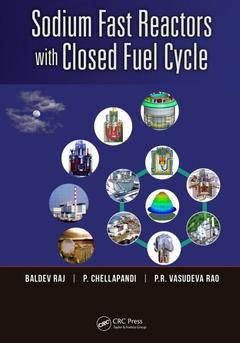Description
Sodium Fast Reactors with Closed Fuel Cycle
Authors: Raj Baldev, Chellapandi P., Vasudeva Rao P.R.
Language: English
Subjects for Sodium Fast Reactors with Closed Fuel Cycle:
Keywords
SFR; Top Shield; Closed Fuel Cycles; Main Vessel; International SFR Experiences; Control Plug; International Sodium Fast Reactor Experiences; Hot Pool; Reactor Physics; Fast Reactor; Fuel Pin; SFR Analysis; Grid Plate; SFR Commissioning; Decay Heat Removal; SFR Concepts; Primary Sodium; SFR Construction; Rotatable Plug; SFR Decommissioning; IHX; SFR Design; MOX Fuel; SFR Economics; Fast Spectrum Reactors; SFR Engineering; Secondary Sodium; SFR Fuel Cycle; Decay Heat Removal Systems; SFR Materials; Sodium Water Reaction; SFR Mechanics; Core Catcher; SFR Safety; Sodium Leak; SFR Validation; Sodium Fire; Sodium Fast Reactor Analysis; SGDHR; Sodium Fast Reactor Commissioning; Thermal Baffles; Sodium Fast Reactor Concepts; Fission Products; Sodium Fast Reactor Construction; MA; Sodium Fast Reactor Decommissioning; Thermal Striping; Sodium Fast Reactor Design; Sodium Fast Reactor Economics; Sodium Fast Reactor Engineering; Sodium Fast Reactor Fuel Cycle; Sodium Fast Reactor Materials; Sodium Fast Reactor Mechanics; Sodium Fast Reactor Safety; Sodium Fast Reactor Validation; Sodium Fast Reactors; Sodium Fast Reactors with Closed Fuel Cycles; Sodium-Cooled Fast Reactors; Sodium-Cooled Fast Reactors with Closed Fuel Cycles
262.97 €
In Print (Delivery period: 15 days).
Add to cartPublication date: 04-2015
· 17.8x25.4 cm · Hardback
120.12 €
In Print (Delivery period: 14 days).
Add to cartPublication date: 11-2017
· 17.8x25.4 cm · Paperback
Description
/li>Contents
/li>Biography
/li>
Sodium Fast Reactors with Closed Fuel Cycle delivers a detailed discussion of an important technology that is being harnessed for commercial energy production in many parts of the world. Presenting the state of the art of sodium-cooled fast reactors with closed fuel cycles, this book:
- Offers in-depth coverage of reactor physics, materials, design, safety analysis, validations, engineering, construction, and commissioning aspects
- Features a special chapter on allied sciences to highlight advanced reactor core materials, specialized manufacturing technologies, chemical sensors, in-service inspection, and simulators
- Addresses design essentials with a focus on reactor assembly including core and coolant circuits, fuel handling, instrumentation and control, energy conversion, and containment systems
- Provides design codes and standards with sufficient background information to ensure a solid understanding of the underlying mechanics
- Supplies guidelines for concept selection, design, analysis, and validation
Sodium Fast Reactors with Closed Fuel Cycle is a valuable reference for industry professionals involved in the construction of fast-reactor power plants, as well as graduate-level engineering students of the design and development of sodium-cooled fast-reactor systems and components.
Basis and Concepts. Design of Sodium Fast Reactors. Safety. Construction and Commissioning. International SFR Experiences. Fuel Cycle for SFRs. Decommissioning Aspects. Domains of High Relevance to SFR: Typical Examples. Economics of SFRs with a Closed Fuel Cycle.
Baldev Raj, BE, Ph.D, served the Department of Atomic Energy, India over a 42-year period until 2011. As distinguished scientist and director, Indira Gandhi Centre of Atomic Research, Kalpakkam, India (IGCAR), he has advanced several challenging technologies, especially those related to the fast breeder test reactor and the prototype fast breeder reactor. Dr. Raj pioneered the application of nondestructive examination (NDE) for basic research using acoustic and electromagnetic techniques in a variety of materials and components. He is also responsible for realizing societal applications of NDE in areas related to cultural heritage and medical diagnosis. He is the author of more than 970 refereed publications, 70 books, and special journal volumes, and more than 20 contributions to encyclopedias and handbooks, as well as the owner of 29 patents. He is immediate past president, International Institute of Welding and President, Indian National Academy of Engineering. He assumed responsibilities as the director of the National Institute of Advanced Studies, Bangalore, India in September 2014. He is a fellow of all science and engineering academies in India; member of the German Academy of Sciences; honorary member of the International Medical Sciences Academy; member of the International Nuclear Energy Academy; vice president, nondestructive testing, Academia International; and president-elect of the International Council of Academies of Engineering and Technological Sciences.
P. Chellapandi, BE (Hons.), M.Tech., Ph.D, is currently a distinguished scientist and director of the Reactor Design Group at the IGCAR. He specializes in reactor design, thermal hydraulics, structural mechanics, safety analysis, and experimental simulations. He is one of the key persons involved in the design and development activities of the 500 MWe prototype fast breeder reactor (PFBR) since its inception. He has contributed significantly for the PFBR over a wide spec
These books may interest you

PHENIX THE EXPERIENCE FEEDBACK 30.00 €



